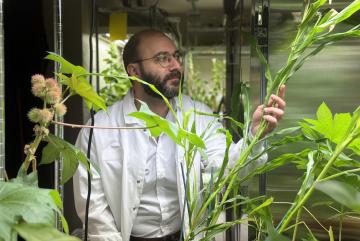
MIT News Office
|
Engineering next-generation fertilizers
MIT postdoc Giorgio Rizzo harnesses plant chemistry to design sustainable fertilizers that could reshape modern farming.
MIT News Office
|
How to reduce greenhouse gas emissions from ammonia production
Proposed system would combine two kinds of plants, creating greater efficiency and lowering costs while curbing climate-changing emissions.
MIT News Office
|
New prediction model could improve the reliability of fusion power plants
The approach combines physics and machine learning to avoid damaging disruptions when powering down tokamak fusion machines.
MIT News Office
|
Fighting for the health of the planet with AI
Assistant Professor Priya Donti’s research applies machine learning to optimize renewable energy.
MIT News Office
|
Report: Sustainability in supply chains is still a firm-level priority
Analysis from MIT’s Center for Transportation and Logistics finds companies are still acting to reduce emissions, but often lag in measurement techniques.
MIT News Office
|
Secretary of Energy Chris Wright ’85 visits MIT
Panel discussions focused on innovation in many forms of energy, then a tour of campus featured student research.
MIT News Office
|
MIT OpenCourseWare is “a living testament to the nobility of open, unbounded learning”
For physicist Mostafa Fawzy, MIT Open Learning’s OpenCourseWare was a steadfast companion through countless study sessions.
MIT News Office
|
Concrete “battery” developed at MIT now packs 10 times the power
Improved carbon-cement supercapacitors could turn the concrete around us into massive energy storage systems.
MIT News Office
|
Responding to the climate impact of generative AI
Explosive growth of AI data centers is expected to increase greenhouse gas emissions. Researchers are now seeking solutions to reduce these environmental harms.










